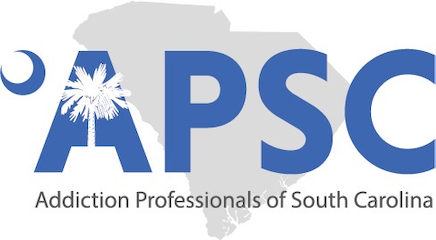
The Addiction Professionals of South Carolina (APSC) Certification Commission supports the concept of voluntary certification through assessing and validating the competency of addictions counselors. The certification process focuses on the individual’s current level of knowledge and skills in substance use disorder counseling.
The South Carolina certification was designed to:
- Define the role and functions of the addictions counselor;
- Evaluate the education and experiential training of each individual due to the variety of therapeutic disciplines, approaches, techniques and values; and
- Evaluate the knowledge and skills with focus on the Domains.
Applicants for certification should be aware that the certification process is not a process through which, in itself, one can develop competency as a counselor. The process of certification is a competency-based process that presumes that at the point of application a certain level of competency already exists. It is a process that affirms and certifies existing competence. Therefore, it should be expected that individuals having little or only basic experience in the counseling Domains should be prepared to encounter some greater degree of difficulty in demonstrating competency for certification than would individuals who have more than entry-level experience.
History
In 1975 the Alcohol and Drug Abuse Association of South Carolina was formed by a group of directors, counselors and intervention specialists. It was believed that workers in the field of addictions needed a vehicle by which to assure that trends and innovations in the field were disseminated to aid the professional growth and development of its workers.
The Association determined that a certification procedure needed to be instituted to assess the level of counselor competence. The first written test was administered at the College of Charleston and at the University of South Carolina in December of 1977. The first test was given to over 100 people who aided in setting the standards for the certification system. Oral interviews were established in 1977.
In 1982, the process was taken over by the (then) South Carolina Commission on Alcohol and Drug Abuse (now the Department of Alcohol and Other Drug Abuse Services). DAODAS offered credentialing in five specialty areas: Master Counselor, Clinical Counselor, Intervention Specialist, Primary Prevention Specialist, and Addictions Associate. Also offered was credentialing for ADSAP and SCIP Structured Group Leader. The system was maintained by DAODAS until December 1995 at which time the South Carolina Association of Alcoholism and Drug Abuse Counselors assumed responsibility for the certification system. In 2019, SCAADAC became the Addiction Professionals of South Carolina (APSC). The Certification Commission is established by APSC to maintain the certification system.
Philosophy
The APSC Certification Commission acknowledges that addiction continues to increase. The impact on society is demonstrated through concerns and problems that exist in families, schools, workplace, and the criminal justice system. Since the effects are broad in scope, the treatment provided to individuals and families must be narrow in focus. The counseling Domains are set forth to identify the skills and knowledge which must be demonstrated in order to provide quality care.
The APSC Certification Commission has adopted this process of counselor certification to validate the skills and knowledge of individuals who are responsible for the provision of care to improve the lives of persons who are identified as having a substance use disorder.

